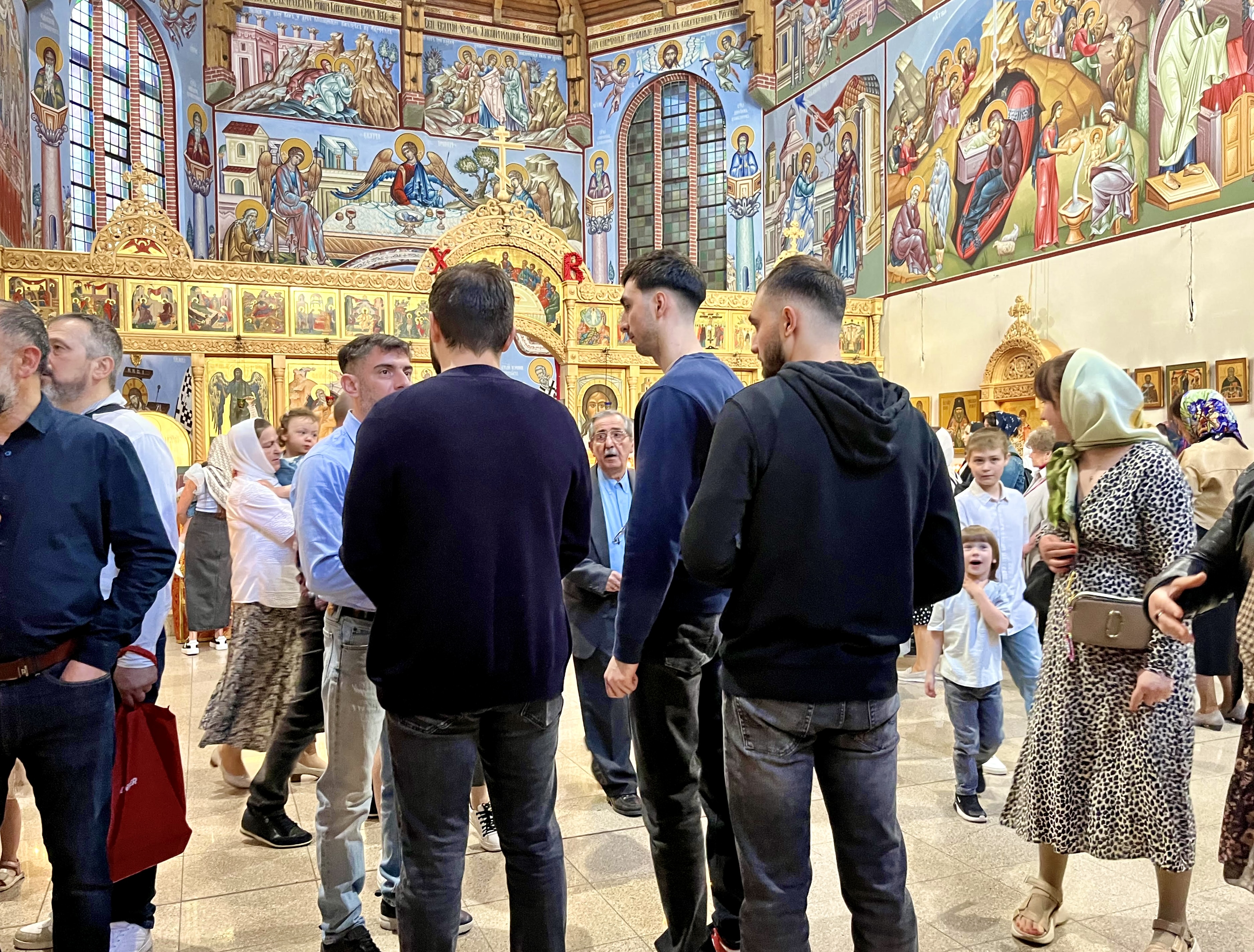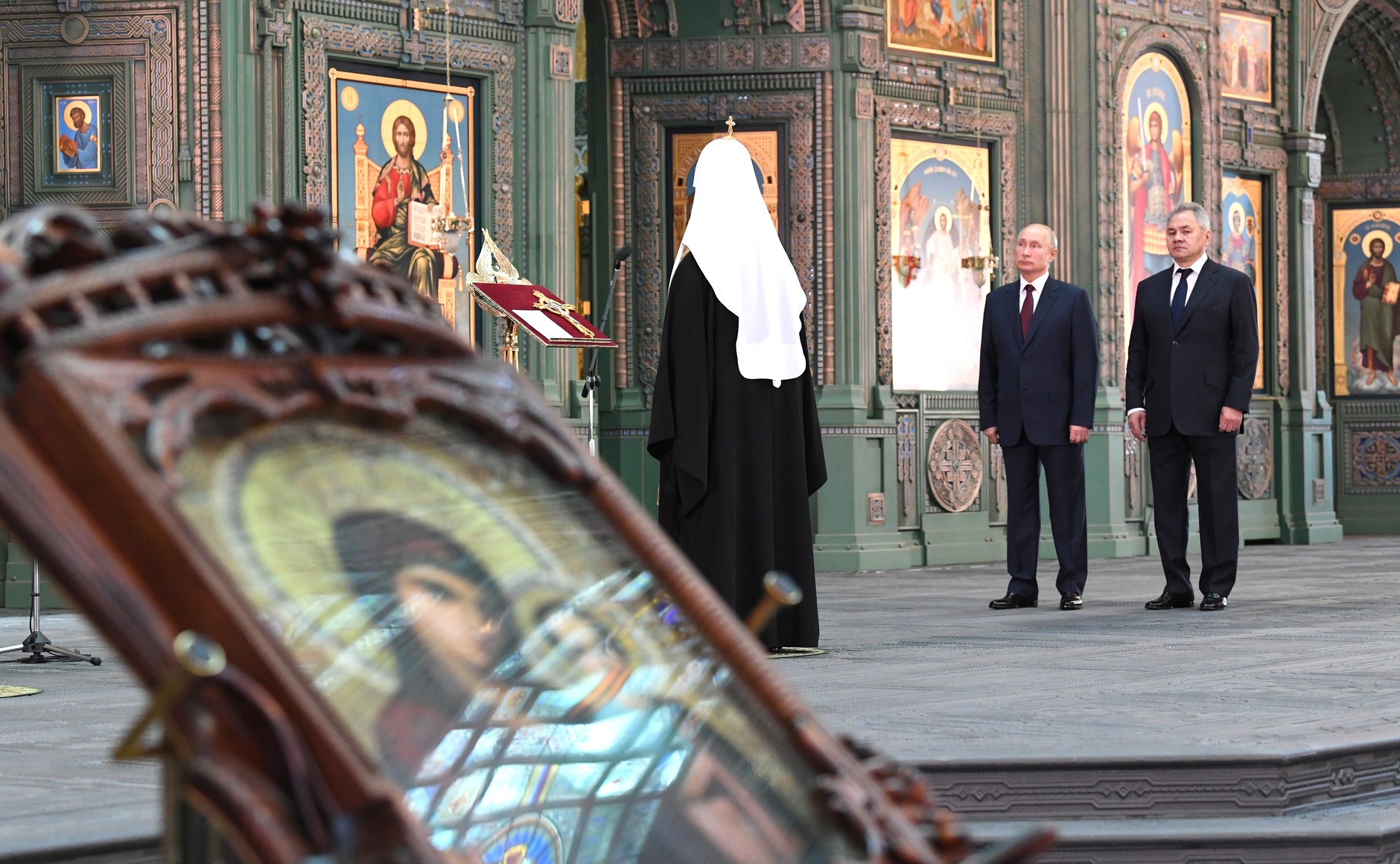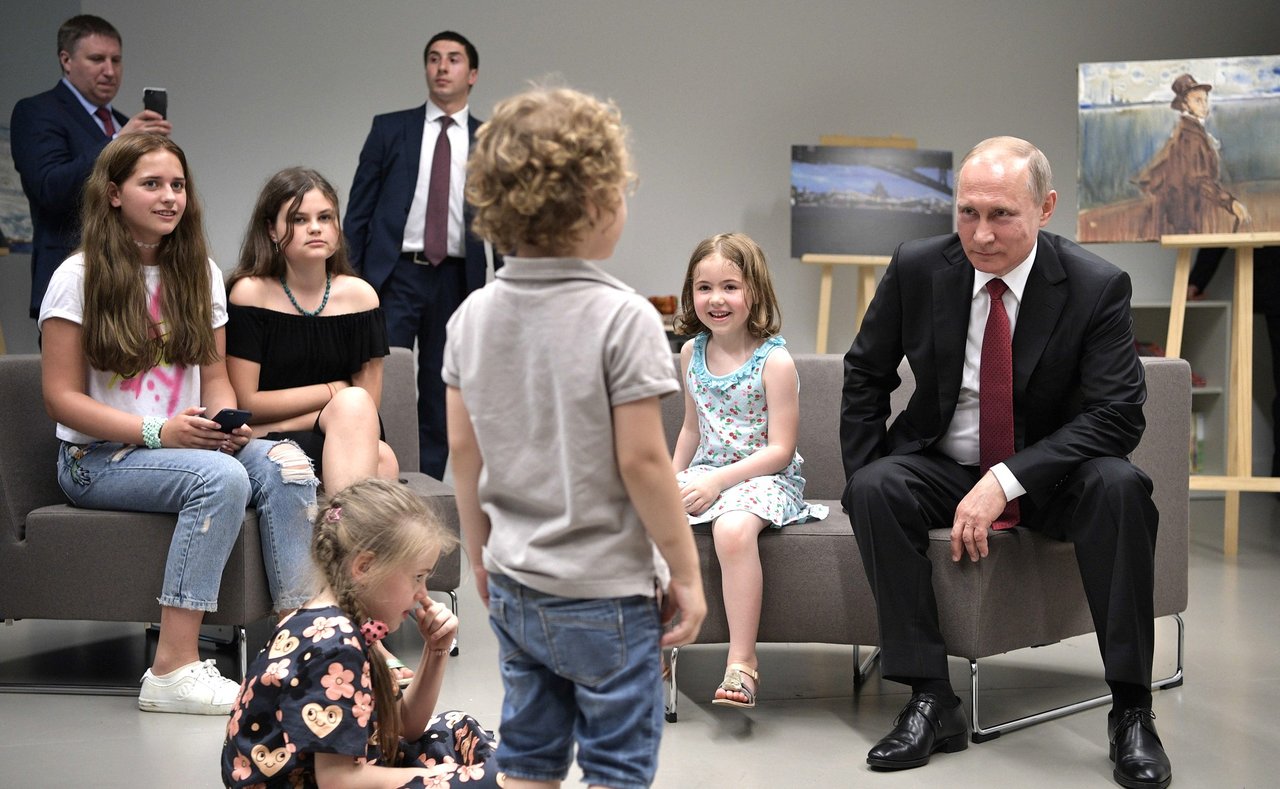Feature
Wolf in sheep's clothing? The two faces of the Russian Orthodox Church
The Russian Orthodox Church looks tamer inside the EU than it does in Russia — but the Kremlin’s weaponisation of religion has made it a security concern.
Surrounded by gaily-painted icons and frocked in an ornate red-and-gold vestment, archpriest Pavel Nedossekine praised the virtues of St John the Russian, an 18th century martyr, in his homily at the Holy Trinity church in Brussels city centre on Sunday 9 June.
He also invited people on a pilgrimage to St John’s relics in Greece.
But even though he spoke in times of acute geopolitical tension and on the morning of EU and Belgian elections, Nedossekine didn’t mention the Ukraine war or politics.
He spoke to about 120 worshippers, who almost filled the small nave, where women veiled their hair and stood on a separate side of church to men, according to custom.
People wore modest clothes and there was an inclusive atmosphere, with children playing at the rear of the church, and with members of the congregation chatting in Chechen, French, a Roma dialect, and Ukrainian, as well as Russian.
At one point, a woman silently offered EUobserver’s reporter two phosphora (holy bread) wrapped in tissue paper and a prayer candle.
And “there was nothing about the service I found disturbing," said Olga F., a refugee from the Ukrainian town of Irpin, who now lives in Belgium, and who attended the Russian liturgy.
"He [Nedossekine] didn’t mention the war, unless he did it so quietly I didn’t hear him. My ears pricked up when I heard him say ‘soldiers’, but he was only speaking about soldiers from the story of St John,” she said.
“For me, personally, it felt a little bit like stepping back into the 19th century, but it was just a fairly ordinary Russian service,” she added.
After mass, Nedossekine declined to speak to EUobserver on how the Ukraine war had affected the Russian diaspora in Belgium, saying he needed permission from the church hierarchy.
But he added: "You know, there has been a Russian presence here in Belgium for over 100 years. It includes many different kinds of people and different opinions".
Holy Trinity is one of 18 Russian churches, chapels, and monasteries in Belgium, served by some 25 priests and led by archbishop Simon in Brussels.
The church has a diplomatic mission to the EU institutions, also in Brussels, led by archimandrite Philip.
And the Ukrainian Orthodox Church (but of the Moscow Patriarchate), a Russia-allied Ukrainian splinter-church, has been holding new pop-up masses in the Belgian town of Leuven since at least April, EUobserver has learned.
Aside from liturgies, sacraments, and pilgrimages, the Russian church plays a wider role in community life in Belgium, by doing fundraising, Sunday schools, and children’s plays - with photos in the corridor at Holy Trinity in Brussels showing a recent production, which was strikingly entitled 'The Death of the Spy Gadyukin', after a 1960s film.
The church also takes part in events with the Co-ordination Council of Russian Compatriots in Belgium (a branch of the Russian foreign ministry) and with Russian House Brussels (a limb of Russia’s embassy to Belgium).
Some 10,000 Russians first fled to Belgium in the 1920s Russian Civil War.
And the diaspora has grown in recent decades: Over 20,000 Russians also took Belgian nationality since 1992, including some 2,000 since Russia’s full invasion of Ukraine in 2022, according to Belgian figures.
A further 11,125 Russian citizens lived in Belgium today, many of them in Brussels in the Uccle and Ixelles districts, and in Antwerp.
"We don't have information on how many people 'identified' as Russian”, or how many were dual nationals, Belgium’s statistics office said.
But a survey inside Russia in June last year showed how widely Russian identity was bound up with its church: Just 12 percent of Russians regularly went to mass, Russian pollster Levada said, but 72 percent identified as "orthodox" and 83 percent had been baptised.
Millions of ethnic Russians also lived in Germany and hundreds of thousands more in Estonia, Italy, Latvia, and Spain.
The Russian church had some 350 Parishes in Estonia, Germany, Italy, Latvia, and Spain put together.

'Complicit in war crimes'
Back in Belgium, archbishop Simon and archimandrite Philip also declined to speak to EUobserver, but if they had agreed, they might have had to justify an uglier side of their institution.
Like Nedossekine, many Russian priests in the EU prefer to stay quiet on politics.
"In western Europe, the [Russian] clergy is trying to remain silent about the war, since not only many parishioners, but also many priests, judging by my conversations ... take an anti-war position”, said Nikolay Mitrokhin, a sociologist of religion at the University of Bremen in Germany.
But inside Russia, the church is an ardent supporter of Russian president Vladimir Putin's brutality, causing mistrust abroad.
Russian patriarch Kirill personally consecrated the Holy Trinity church in Brussels in a ceremony in 2003.
He also ordered all his priests on 1 March 2022 to insert prayers for victory by "Holy Rus" [Holy Russia] against Ukraine into liturgies and defrocked ones who disobeyed.
A Russian church synod called for a "holy war" against Western “Satanism” in a declaration on 27 March this year.
The Council of Europe in Strasbourg said on 17 April the Russian church was “complicit in war crimes” in Ukraine.
The EU has blacklisted the church's Russian broadcaster, Spas TV, which "calls the occupied territories of Ukraine, Russian" and associates "the West and Ukraine with godlessness and the devil", according to the EU Council.
One of its former top bishops, Leonid Gorbachov, used to post videos of Russian fighters abusing Ukrainian POWs on his Telegram social-media channel.
And Kirill himself narrowly evaded an EU visa-ban and asset-freeze in 2022, only due to a veto by Hungary's Putin-friendly prime minister Viktor Orbán.
The EU foreign service said no one had met archimandrite Philip, Kirill's envoy in Brussels, since "at least" 2022, when Russia invaded Ukraine.
It also showed how low the church's reputation had sunk.
"The role of churches should be to foster peace, non-violence, mutual understanding, and reconciliation. The Russian Orthodox Church is led by patriarch Kirill, who keeps collaborating with the Kremlin regime in the oppression of the Russian people ... and supports Russia’s aggression against Ukraine with pro-Kremlin propaganda," an EU foreign service spokesman said.
For its part, Latvia took steps to separate its orthodox church from Russia already in 2022, amid concern priests were spreading subversive propaganda.
“The bill enshrines in law a full independence of the [Latvian] church and its autocephalous status, dissociating it from the influence of the aggressor state – the Russian Federation," its legislation said.
The Estonian parliament, the Riigikogu, in a resolution on 6 May, also described the Russian church as "a direct threat to the public and constitutional order".
Despite their concern, Mitrokhin, from Bremen, said: "The Russian Orthodox Church has very limited influence on the Russian-speaking diaspora, and politically - almost zero".
But not all Russian priests in the EU were as meek as Nedossekine was last Sunday in Brussels, according to Kristina Stoeckl, a sociologist at LUISS Guido Carli University in Rome.
"There are with no doubt many parishes of the Russian Orthodox Church outside of Russia that fully follow the line of their leadership [Kirill]", she told EUobserver.
"Anecdotally, I can tell you that Russian friends who fled Russia [to Europe] after the outbreak of the war have felt unwelcome in the Russian parishes in the cities where they arrived to, because many parishioners are 'patriotic' and support the war and they look upon victims and critics of Putin and the regime with suspicion," she said.
Speaking from Austria, which is home to over 30,000 ethnic Russians, Liliia Sablina, a Russia researcher at the Central European University in Vienna, also said: “The primary problem is that many Russian-speakers hold EU passports, but feel themselves as members of the ‘Russian World’.”
“Such people can de-democratise European countries from within, for instance, via giving their votes to far-right parties which are facilitated by Russia", she said.

'Tried-and-tested' cover for spies
Propaganda aside, the Russian church also has a history of collaboration with Russian spy services, prompting hard security concerns.
Kirill himself was a spy in Geneva in the 1970s for the Soviet-era KGB intelligence service, according to Swiss media, citing declassified archives.
Latvia's autocephaly law flagged "national security interests".
The Estonian foreign intelligence service, EFIS, warned in a report in 2023 that Russian spies were using the Russian church as "a tried-and-tested cover in foreign countries".
“Maintaining the position of the Russian Orthodox Church [ROC] in foreign countries is crucial to the long-term interests of the Russian special services, which is why the leaders of the ROC branches have been given the liberty to pretend to be a loyal local religious organisation,” it added.
Estonia expelled its most senior Russian priest, metropolitan Eugene, on 18 February after an "individual threat assessment" by its domestic intelligence service, Kapo.
"The church is one of the few remaining levers for Russian influence operations that are not yet directly affected by international sanctions," Kapo said.
Sweden (home to over 20,000 ethnic Russians) also stopped state funding for Russian churches on 31 May, after the Swedish homeland security service, Säpo, warned that Russia was using "the religious community as a platform for intelligence gathering and other security-threatening activities".
And Western leaders ought to impose "tighter restrictions on Russian intelligence personnel across the alliance", said Nato secretary general Jens Stoltenberg in Brussels on 14 June, following a string of Russian-linked, low-level sabotage attacks in the Czech Republic, Germany, Lithuania, Poland, and the UK.
For its part, Belgium expelled some 60 Russian spies working under diplomatic cover since 2022, its homeland intelligence service, the VSSE, told EUobserver.
It declined to say if it saw the Russian church as a threat, the way Latvia, Estonia, and Sweden did.
Belgium's justice ministry also declined to answer when asked what were legal red lines against potential hate speech or radicalisation in orthodox or other church services.
But for all Nedossekine's quietism at Holy Trinity in the EU capital, Putin's hybrid tactics were seeing his church and the Russian diaspora in wider Europe put under greater scrutiny, Western security sources indicated.
Over 64,400 Ukrainians now also lived in Belgium, most of them refugees, and some of those who have campaigned against Putin, such as Olga F., told EUobserver that they feared being put under Russian surveillance, even in the EU and Nato HQs' symbolic host nation.
“I don't know what they're capable of,” also said Marta Barandiy, a Belgian of Ukrainian origin, who ran (unsuccessfully) in the European Parliament elections, after what she believed were "Russian forces" burgled her office in the EU district in Brussels on 13 May.
A Western intelligence contact told EUobserver that Russian spies used civilians from its diaspora to do their dirty work because it created "plausible deniability", so that "they [Russian authorities] can say 'it's nothing to do with us', even if the perpetrators are caught".
Speaking about the threat of religious propaganda, a second Western intelligence source said: "Sometimes, it doesn't matter if you're a Russian 'patriot' or not."
"Russian services have become increasingly ruthless since the [Ukraine] war - they wouldn't think twice about blackmailing a decent person living in Belgium to work for them, by threatening their relatives in Russia if they didn't comply," he said.

Author Bio
Andrew Rettman is EUobserver's foreign editor, writing about foreign and security issues since 2005. He is Polish, but grew up in the UK, and lives in Brussels. He has also written for The Guardian, The Times of London, and Intelligence Online.